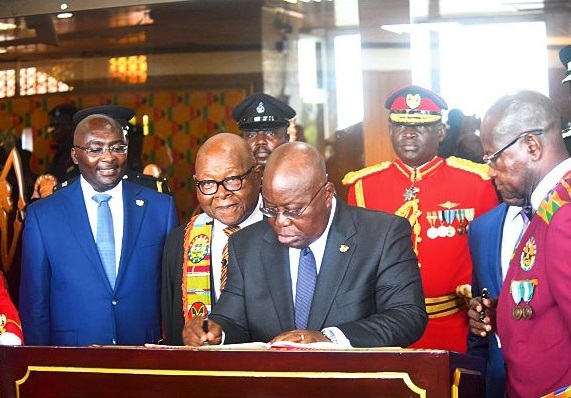Prez Akufo-Addo signals intention to reverse growth trend -Tax exemptions…
President Nana Addo Dankwa Akufo-Addo, has identified the country’s tax exemption regime as a major challenge to revenue mobilisation and fiscal stability.
“Revenue mobilisation poses the biggest challenge in the management of our economy, with the tax exemption policy in particular proving to be an Achilles’ heel and a growing menace to fiscal stability and revenue generation,” he said.
Delivering the 2019 State of the Nation Address to Parliament in Accra yesterday, he recalled that in the last eight years, tax exemptions with respect to import duty, import Value Added Tax (VAT) and National Health
Insurance Levy (NHIL) and domestic VAT had grown from GH¢392 million in 2010, representing 0.6 per cent of gross domestic product (GDP) for that year, to GH¢4.66 billion in 2018, representing 1.6 per cent of GDP for that year.
He said the figures did not include exemptions from the payment of corporate and individual income taxes, concessions on tax rates, petroleum tax reliefs, customs tax exemptions enjoyed by diplomatic missions and waiver on processing charges at the ports.
The growth trend in tax exemptions, President Akufo-Addo said, was not sustainable and served notice that the government intended to take action to reverse the trend.
“If we continue at this rate, in less than 16 years, half of Ghana’s revenue base will be given away as tax exemptions,” he stated.
Economic discipline
President Akufo-Addo stressed that for the economy to thrive, its foundamentals would have to be sound.
“I believe we have all now agreed that the fundamentals have to be sound if the economy is to flourish,” he said, adding that the government was committed to delivering and maintaining a vibrant, robust and sound economy.
He said the country had just concluded a programme with the IMF and was expected to sign off from the deal in April 2019, through continuing fiscal discipline.
That would be the 17th time the country had to go to the IMF in the 62 years of independence, he said.
“Mr Speaker, we cannot make the progress we all desire unless we are consistent and disciplined in the management of our economy.
The nature of the boom and bust has not helped us achieve our goal of sustained prosperity and lift us out of poverty.
We have gone through another round of painful impositions to get to where we are today with healthy fundamentals,” he said.
Fiscal discipline
President Akufo-Addo said the government had imposed on itself fiscal discipline, paying off legacy debts, deepening good governance practices and growing business confidence.
That, he added, had helped to realise the positive and stable economic outcomes and that the government expected the good performance to continue, particularly as it prepared to exit the IMF programme.
“We know election years will come around and there will be pressure on the government to splurge and persuasive arguments will be made that you have to stay in government to be able to implement your programmes,” he noted, but emphasised that he was bent on running a responsible administration, mindful of the next generation and not merely the next election.
Economic growth
President Akufo-Addo said the economy had grown very strongly in the last two years, from 3.4 per cent in 2016, real GDP grew to 8.1 per cent in 2017, with provisional data for the first three quarters of 2018 indicating strong real GDP growth of six per cent, higher than the annual target of 5.6 per cent.
“Our trade balance account, for the first time in more than a decade, recorded a surplus in 2017 and is expected to remain in surplus,” he added
He said the government’s efforts at strenghening the economy were bearing some fruits and the world had taken notice of the improvement in the economic fundamentals.
The President recalled that in September last year, after almost a decade, Ghana received its first Sovereign Credit rating upgrade from Standard & Poor’s (S&P) from ‘B’ with a negative outlook to ‘B’ with a stable outlook.
“Mr Speaker, to consolidate further the relations between the social partners in the post-IMF era, the government will shortly sign a landmark social partnership agreement with organised labour, the Trades Union Congress and the Ghana Employers Association, to provide a medium for building a sense of cohesion, trust, self-management, frank and open discussions to champion the cause of development,” President Akufo-Addo stated.
Source: Graphic online



